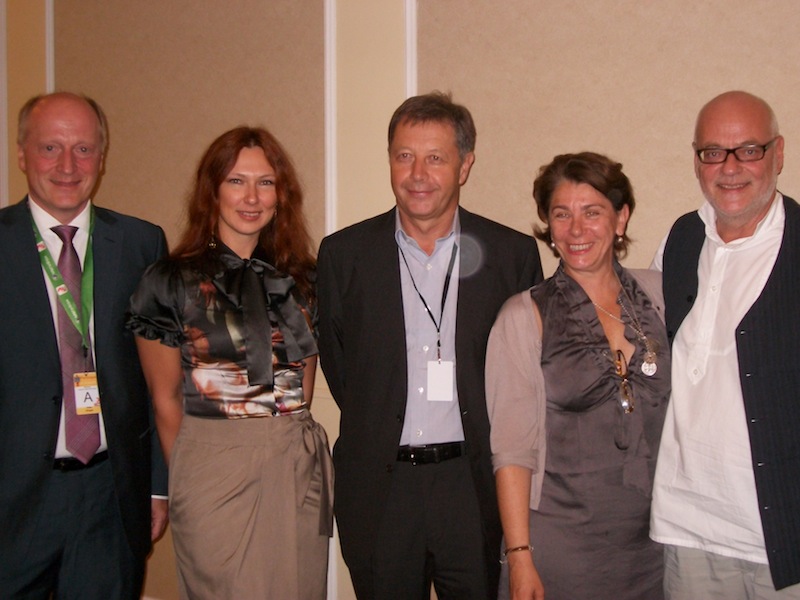« Cannes 64 (Teil 3) | Home | Voices from Vologda »
Boost for Closer Collaboration in Cinema Between Germany and Russia
By Martin Blaney | July 25, 2011

In photo: Happy funders Peter Dinges (FFA), Elena Romanova (RCF), Sergei Tolstikov (RCF), Kirsten Niehuus (Medienboard Berlin-Brandenburg), and Manfred Schmidt (MDM), courtesy of MDM
A year before the Germany-Russia Year of Culture begins and relations between the two countries in the field of cinema have received a major boost in the past few weeks.
A start was made at the Moscow Business Square during this year’s Moscow International Film Festival (MIFF) when three German film funds – the German Federal Film Board (FFA), Medienboard Berlin-Brandenburg and Mitteldeutsche Medienförderung (MDM) –joined forces with the Russia Cinema Fund (RCF) to launch an agreement to encourage the joint development of projects by German and Russian film producers.
According to the signed document, the programmes wishes “to support the development of projects with the intention to increase the number of German and Russian co-productions between Russian and German producers.” It will provide up to 150,000 Euros a year for the co-development of film projects, with the FFA and the RCF each contributing € 50,000 and Medienboard and MDM € 25,000 each.
Manfred Schmidt, who was one of the agreement’s signatories, says that it would “enable projects between German and Russian producers, directors and screenwriters to be developed at from an earlier stage, which could have chance of finding interest with audiences in both Germany and Russia as well as elsewhere in Europe.”
Meanwhile, Elena Romanova, head of RCF’s international department, points out that the joint venture with Germany makes perfect sense given the “historical relationship” of co-productions between Russia and Germany from recent years.
Germany has been the leading foreign partner for co-productions with Russia between 2006-2010, leading the field with participation in 11 of the 46 minor or major co-productions with such projects as Sergei Bodrov’s Mongol, Alexander Mindadze’s Berlinale competition film Another Saturday (see review in KINO 100) , Veit Helmer’s Baikonur and Achim von Borries’ 4 Days In May (4 Tage im Mai) which will have its premiere on the Piazza Grande in Locarno at the beginning of August.
This is the third co-development venture initiated by German film funds with foreign partners after the German-Polish Co-Development Fund and the German-Turkish Co-Production Development Fund.
If funders and producers were pleased at having achieved this step of closer collaboration, imagine their elation three weeks when the long-anticipated German-Russian Co-Production Treaty was at long last officially signed.
The signs were already there in Moscow that it would only be a matter of time – and hopefully by the end of this year – that the treaty’s seemingly neverending odyssey through the bureaucracies of both countries would be brought to a satisfactory conclusion.
This became reality at the 11th Petersburger Dialog inter-governmental consultations in Hanover and Wolfsburg on July 18 & 19.
An agreement on “cooperation in the audiovisual field” was signed by Germany’s Foreign Minister Guido Westerwelle and the Russian Federation’s Culture Minister Alexander Avdeev in the presence of Chancellor Angela Merkel and President Dmitry Medvedev. The agreement, which sets out the guidelines for co-productions between Germany and Russia, had been over ten years in preparation with many stops and starts.
Moreover, it was partly due to the snail-like progress of the negotiations on the treaty that the German-Russian Film Academy was established in summer 2009 to provide a forum for lobbying and promoting closer links between the two countries’ film industries.
The members of the Film Academy had lobbied hard for the co-production treaty and had also been a guiding force in the setting up of the German-Russian Co-Development Agreement.
Having the co-production treaty finally in place will now provide the formal framework for a working relationship which is certain to bring forth numerous interesting artistic collaborations between Germany and Russia in the future.
Topics: Misc. | Comments Off on Boost for Closer Collaboration in Cinema Between Germany and Russia
Comments are closed.
